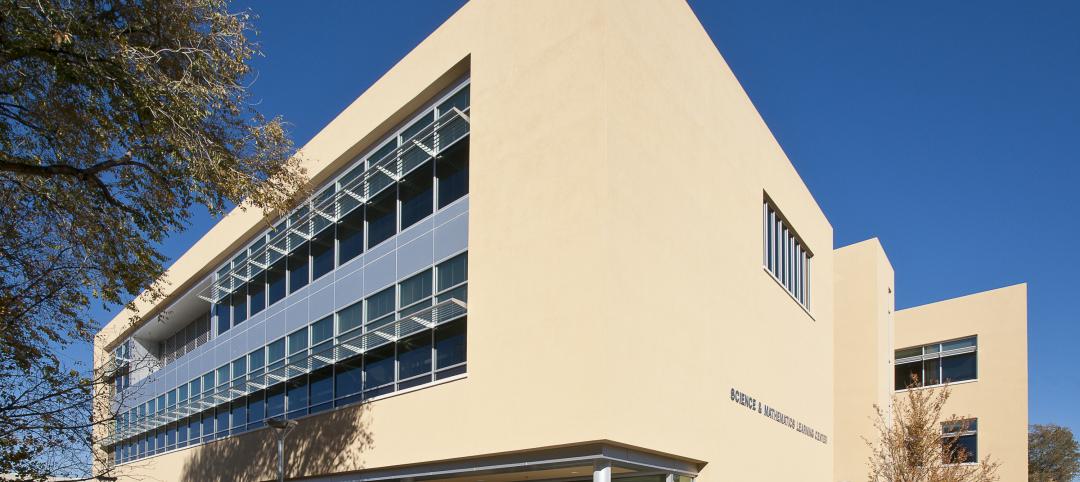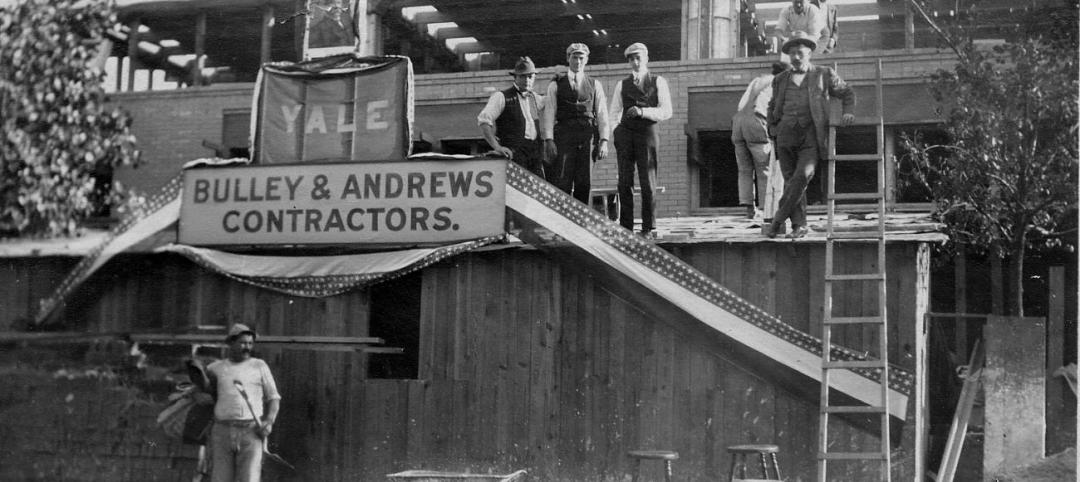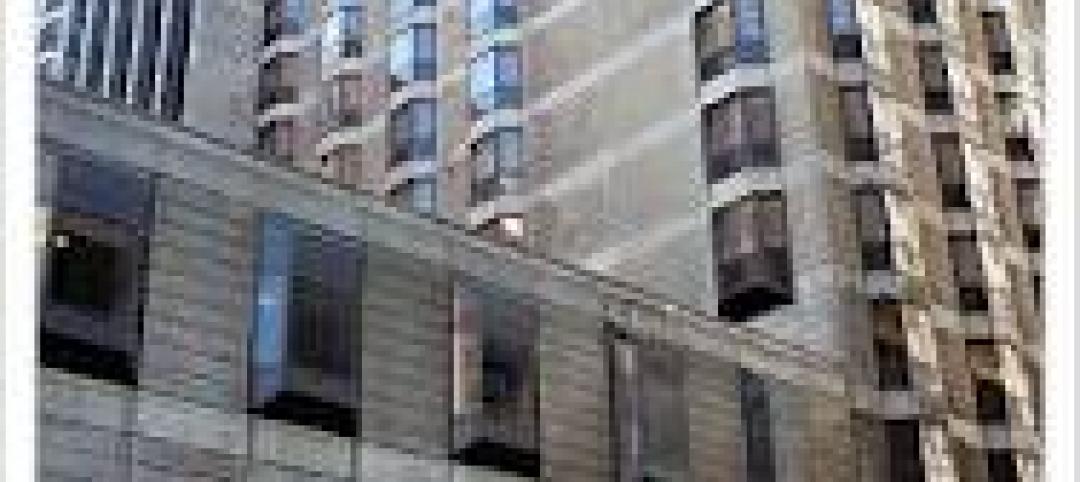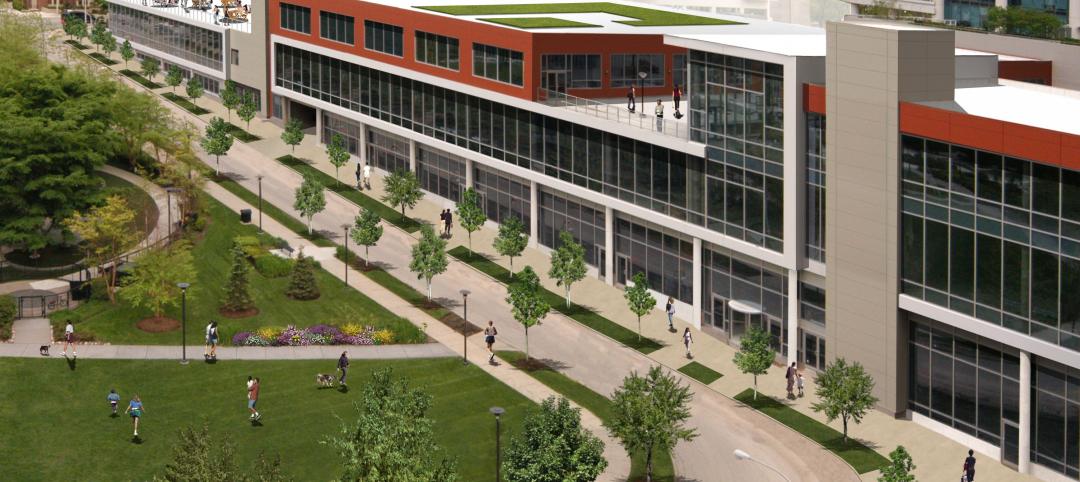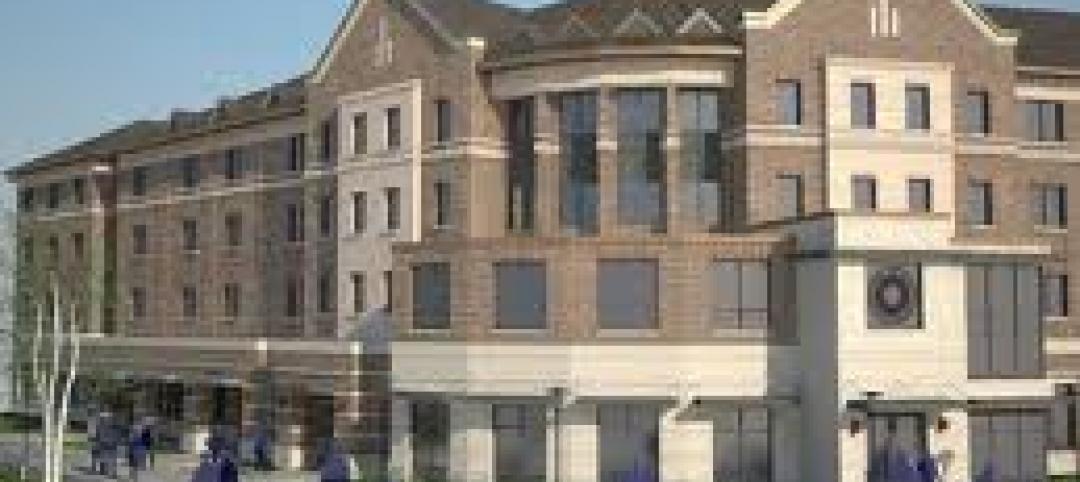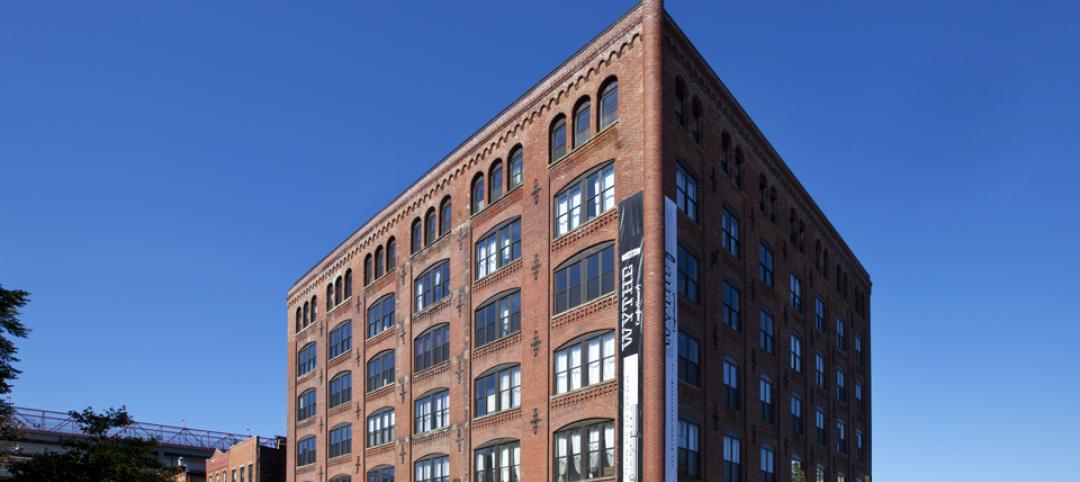 |
 |
| The 6,500-sf rooftop patio proved a big draw for residents living in this Minot, N.D., mixed-use complex. Composite brick pavers were used because they were lighter in weight, more slip resistant, and softer underfoot than other surface options. Installation took less than a week. |
The new three-story building at 3015 16th Street in Minot, N.D., houses the headquarters of building owner Investors Real Estate Trust (IRET), as well as ground-floor retail space and 71 rental apartments. The 215,000-sf mixed-use building occupies most of the small site, while parking takes up the remainder. The chance of squeezing in grade-level outdoor space for the apartment tenants was nil.
Dave Pankow, director of risk management and construction services for IRET, knew that outdoor living space can be a huge draw for prospective tenants—even in North Dakota, where long winters limit outdoor time. With no land available, however, “The roof was the logical place to go.”
A 6,500-sf rooftop patio—complete with pergola—was worked into the plans and constructed above part of the first-floor offices. Specifications called for the use of a permeable product to ensure proper water drainage, and the roof structure was sufficiently beefed up to handle the weight of concrete pavers.
When Pankow turned to his go-to masonry supplier, Hebron Brick and Block Supply, Fargo, N.D., he was encouraged to skip concrete pavers and go instead with a product that would be lighter in weight, more slip resistant, and softer underfoot. Hebron recommended two options: 100% rubber pavers, or VAST pavers, which are composite pavers made from 95% recycled scrap automobile tires and post-consumer plastic containers. (VAST co-founder Andy Vander Woude was recognized in our January 2010 issue as one of our 40 Under 40 winners.)
 |
| VAST teamed with concrete wall panel manufacturer Fabcon on thinbrick wall panels, made from the same recycled materials as the pavers. |
Pankow selected the VAST pavers, choosing a 3x6-inch brick, because he thought the pavers had a more attractive appearance than rubber and preferred its earth-tone color options. In addition, building owner IRET likes using sustainable features in its projects (enough to have incorporated a geothermal heating and cooling system into the Minot building), and going with VAST's cradle-to-cradle green elements added another sustainable element. According to VAST, the pavers used on the building's patio kept 3,250 tires and 97,500 plastic containers out of landfills.
Subcontractor Greenway Pavers, Minneapolis, is well versed in VAST because the company uses the product exclusively. “It's all we install,” said Paul Ramacher, owner of Greenway Pavers. “We don't touch concrete products unless it's to rip them out and put these in.”
Installation took place just before Thanksgiving 2008, and it was a race against the clock to beat the early North Dakota winter. “We installed it in half the time it would have taken with concrete pavers,” said Ramacher. “We started on a Tuesday and by Sunday afternoon we were done, and that included all the cutting,” he said.
VAST installs in self-aligning, eight-brick grids (made from the same recycled material); the bricks themselves can be cut with conventional wood saws. “When our installers fit the pavers into the grids, spacing and alignment are right on and that saves us a lot of time,” said Ramacher.
That speed of installation turned out to make VAST pavers the most economical choice for the rooftop patio. “VAST cost more per square foot than concrete pavers,” said Ramacher, “but the average installation costs less”—$15/sf for VAST, $20/sf for concrete—“so you make up your money in labor costs.”
Using the product also seems to have paid off for IRET. Not only did tenants snap up all 71 apartments, there's a waiting list. “The rooftop patio has been a strong selling point,” said Pankow.
Related Stories
| Oct 14, 2011
University of New Mexico Science & Math Learning Center attains LEED for Schools Gold
Van H. Gilbert architects enhances sustainability credentials.
| Oct 12, 2011
Bulley & Andrews celebrates 120 years of construction
The family-owned and operated general contractor attributes this significant milestone to the strong foundation built decades ago on honesty, integrity, and service in construction.
| Oct 6, 2011
GREENBUILD 2011: Growing green building market supports 661,000 green jobs in the U.S.
Green jobs are already an important part of the construction labor workforce, and signs are that they will become industry standard.
| Oct 5, 2011
GREENBUILD 2011: Brick offers growing options for sustainable building design
Brick exteriors, interiors and landscaping options can increase sustainability that also helps earn LEED certification.
| Oct 4, 2011
GREENBUILD 2011
Click here for the latest news and products from Greenbuild 2011, Oct. 4-7, in Toronto.
| Oct 4, 2011
GREENBUILD 2011: Methods, impacts, and opportunities in the concrete building life cycle
Researchers at the Massachusetts Institute of Technology’s (MIT) Concrete Sustainability Hub conducted a life-cycle assessment (LCA) study to evaluate and improve the environmental impact and study how the “dual use” aspect of concrete.
| Oct 3, 2011
Magellan Development Group opens Village Market in Chicago’s Lakeshore East neighborhood
Magellan Development Group and Hanwha Engineering & Construction are joint-venture development partners on the project. The Village Market was designed for Silver LEED certification by Loewenberg Architects and built by McHugh Construction.
| Sep 29, 2011
Busch Engineering, Science and Technology Residence Hall opens to Rutgers students
With a total development cost of $57 million, B.E.S.T. is the first on-campus residence hall constructed by Rutgers since 1994.
| Aug 31, 2011
Wythe Confectionary renovation in Brooklyn completed
Renovation retains architectural heritage while reflecting a modern urban lifestyle.


